The world is currently in turmoil, riddled with war and conflict. For the last two decades, the Worldwide Head of the Ahmadiyya Muslim Community, His Holiness, Hazrat Mirza Masroor Ahmad (aba), has been warning of the dire consequences if world leaders do not pursue peace. The Ahmadiyya Muslim Community’s annual Peace Symposium has become an important venue for people of all backgrounds to come together to discuss how peace can be established. This year, over 1,200 people, including more than 550 Ambassadors of State, Members of Parliament, and academics representing 30 countries, attended the 18th National Peace Symposium in Baitul Futuh Mosque in the UK. Below we present the official transcript of the keynote address by His Holiness (aba).
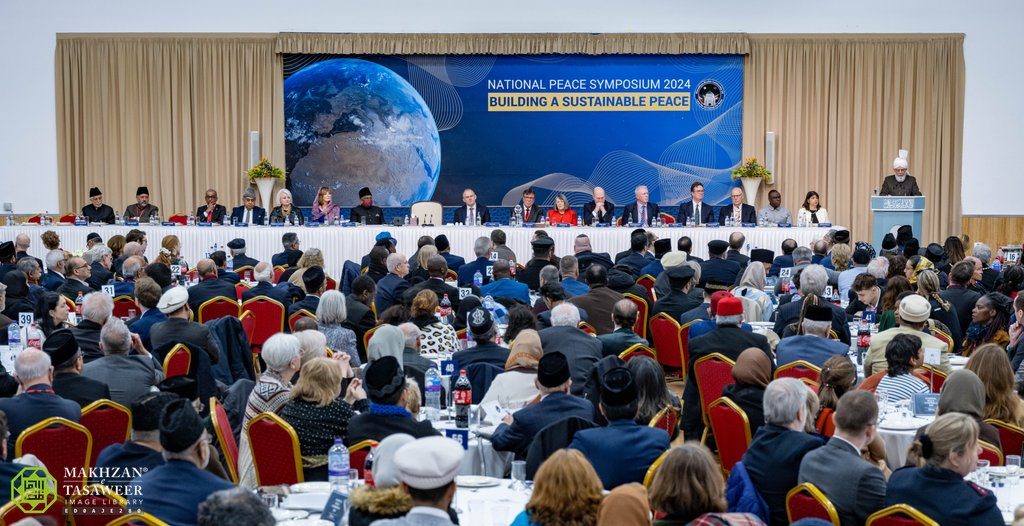
*Please note that this transcript may not be reproduced without express permission, either on other websites or in print format.
Hazrat Mirza Masroor Ahmad (aba), Worldwide Head of the Ahmadiyya Muslim Community, said:
‘Bismillahir Rahmanir Raheem – in the name of Allah, the Gracious, Ever Merciful.
All distinguished guests, Assalamo Alaikum Wa Rahmatullahe Wa Barakatuhu -peace and blessings of Allah be upon you all.
Today, once again, we have gathered together for this event hosted by the Ahmadiyya Muslim Community to discuss and reflect upon how we can bridge division in society and establish genuine peace in the world.
Over Two Decades of Warning
For over two decades, I’ve urged governments, politicians, and all people to play their roles in ensuring social cohesion of our individual societies and the wider peace and harmony of the world. I have expressed my views on how we can bring an end to all forms of warfare, whether conflicts fought falsely in the name of religion or those which are overtly geopolitical. I have not only spoken of the pressing need to end wars between nations, but also to tackle the frustrations that exist locally within communities and to strive for peace in those nations where civil wars or internal disputes arise. Certainly, history teaches us that internal conflicts can spiral into regional wars, often fueled by the interference and influence of external powers and ferment instability and division in other countries to serve their interests.
In recent decades, we have witnessed the devastating consequences of such interference in countries such as Kuwait, Iraq, Syria, and Sudan. Above all, I have repeatedly warned that the unjust policies of the major powers and unfair political, legal and economic systems that have prevailed in much of the world are triggering an ever-rising tide of inequality, which in turn is fueling global instability and insecurity.
Over the years, politicians, intellectuals, or members of the public have invariably agreed with my assertion that we must strive for peace. However, many also expressed their opinion, either directly or indirectly, that I was wrong to believe that existing conflicts could conceivably escalate into a global war and even trigger the use of nuclear weapons. Many considered this to be unnecessarily pessimistic. For a long time, even those intimately engaged in world affairs, such as politicians, foreign policy journalists, or analysts, did not agree with me, either due to their idealism and desire to look at the world through rose-tinted glasses or perhaps due to an incapability to learn lessons from history. They seemingly ignored the widening cracks that have been opening up in recent decades in international relations. Perhaps they simply did not wish to accept the reality of what was staring them in the face. As they say, ignorance is bliss.
Yet, today, as wars rage here in Europe, the Middle East, and elsewhere, many of the same people are now raising the alarm, warning of global war in which nuclear weapons could be used to wreak unimaginable devastation on the world. Despite this realisation, many still seem unwilling to consider what must be done to end these conflicts and remain reluctant to hear the genuine voices for peace that exist in the world.
Given this, as I thought about today’s event, I wondered whether there was any point in us gathering here again. What benefit was there for us to speak about peace and justice if those with the power and ability to influence change were determined not to hear us? The stark reality is that even those institutions founded with the primary objective of maintaining the peace and security of the world are becoming increasingly irrelevant.
The Crippling Effects of Veto Power in the United Nations
For example, the United Nations has become a weak and almost powerless body where a few dominant nations wield all the power and easily override the views of the majority. Instead of deciding each issue based on its facts and merits, nations have formed alliances and vote according to their self interests. Ultimately, critical decisions are made by a few privileged nations in whose hands rests the veto power. Instead of faithfully serving the cause of peace and justice, they wield their veto like a trump card wherever their narrow interests are threatened, irrespective of whether their decision shatters the peace and prosperity of other nations and leads to the death and destruction of scores of innocent people. Let it be clear, therefore, that where a veto power exists, the scales of justice can never be balanced.
Nonetheless, despite these reservations, I realised that I must use this opportunity to speak, because Islam teaches Muslims never to waver in the pursuit of peace. It teaches us to speak the truth so that when held accountable before Allah the Almighty, a believer can truthfully claim to have tried his utmost to save His creation from destruction.
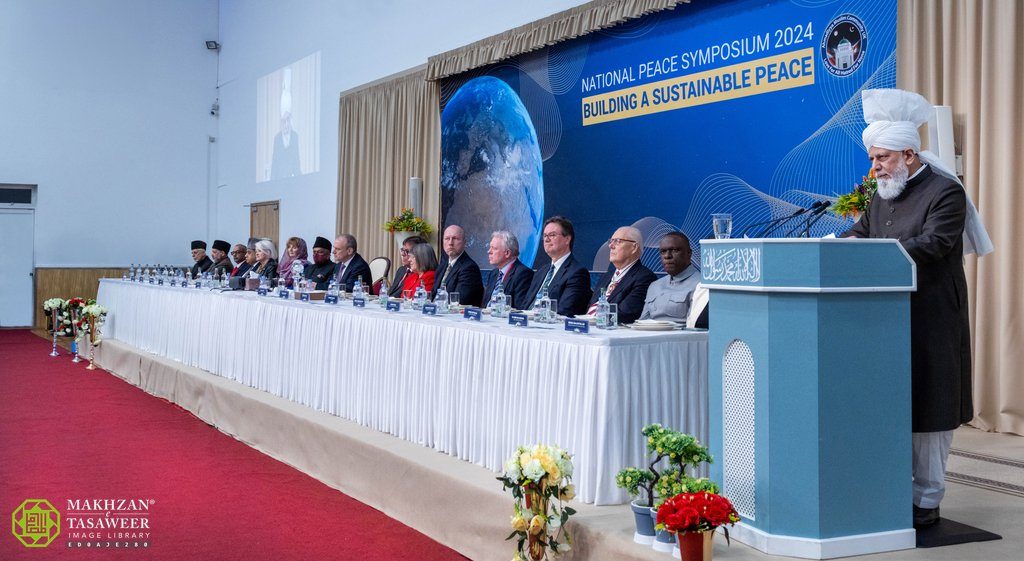
The Ahmadiyya Muslim Community Strives for Peace & Justice
Furthermore, the Holy Prophet of Islam (sa) has stated that the greatest form of jihad – a term that is consistently misunderstood and misrepresented – is to speak truthfully and courageously before one’s leaders, especially those who are hard-hearted, unjust, and cruel. Certainly, if weaker nations or individuals, like myself, who have no political affiliation try to speak up, it is rarely appreciated, and those who do can face difficulties or risk sanctions.
Despite this, the Ahmadiyya Muslim Community, based on the teachings of Islam, continues, and will always continue, to strive earnestly in the cause of peace and champion the rights of those who are powerless and are the victims of injustice. We will, God willing, constantly endeavour to use whatever means we have to influence those within our reach, be they politicians, policymakers, intellectuals, and others, towards establishing peace in the world. Indeed, some of you may well be aware of the consistent efforts our community is making to foster peace and to alleviate the suffering of those who are in grave physical or emotional distress.
All Major Religions Promote Peace
And so, after these introductory words, I now wish to offer my thoughts on how to establish peace in the world. As far as religion is concerned, none of the founders of the major religions, whether the Prophet Jesus (as), Prophet Moses (as), or any other prophets of God, nor the founder of Islam, the Holy Prophet Muhammad (sa) ever taught their followers to disregard the peace of society and to resort to injustice or aggression. While it is true that in certain extreme circumstances, they permitted the use of limited force, it was always exerted solely with the intention of ending warfare and oppression.
As for Islam, it literally means peace, and every aspect of its teachings reflects this name. For instance, in chapter 42, verse 41 of the Holy Qur’an, Allah the Almighty commands that where a person or nation has been wronged, they must never respond disproportionately or stray into the realm of seeking revenge. Furthermore, Allah says that it is better to forgive if it can lead to reformation. Chapter 49, verse 10 of the Holy Qur’an, says that if two nations are at war, neutral parties should mediate between them and strive to establish peace based on the principles of justice and equity. If having reconciled, one party violates the terms of the agreement and again resorts to warfare, other nations should forcefully unite against the aggressor until it desists from its aggressive conduct. Once it stops, the other nations must also cease using force.
Building Sustainable Peace is Underpinned by Justice
The objective should always remain to build sustainable peace underpinned by justice. It should not be that a third party take advantage of the vulnerability of the warring parties by usurping their rights for his own benefit. If this principle were observed at the United Nations and other relevant bodies, conflicts would be resolved far more amicably and swiftly. However, it will prove impossible for true peace to emerge so long as nations, either directly or through their powerful allies, can utilise a veto power. Regrettably, due to its inherent lack of justice, the fate of the United Nations seems set to mirror that of its failed predecessor, the League of Nations. And if the system of international law, weak as it may be, completely collapses, the resulting anarchy and destruction is beyond our comprehension.
Whilst there are a myriad of conflicts taking place in the world, the most pressing and dangerous are those taking place between Israel and Hamas and the ongoing war between Russia and Ukraine. Some people may believe or may have been conditioned to think that the conflict between Israel and
Palestine is a religious war. However, in reality, it is a geopolitical and territorial conflict. As for the war in Ukraine, it is very evidently a geopolitical war being fought for territorial reasons. I firmly believe there is only one way to end these wars: by ensuring that justice prevails and that whatever settlements are made are based on equity as opposed to what better serves the interests of external powers. Otherwise, there’s no benefit to the United Nations or international laws, and the only rule that shall hold weight will be the one that declares “might is right.”
In terms of the Ukraine war, Russia has veto power at the UN Security Council, whilst, in effect, Ukraine also has one by virtue of its alliance with those Western nations who have permanent membership of the Security Council. How can a settlement be agreed if both sides can effectively wield a veto? Why would either party be motivated to move even an inch if they know they can veto any deal not weighted entirely in their favour?
As for what is happening in Gaza, though both the Israelis and the Palestinians have their supporters, the veto power has only been used in Israel’s favour since the current war ignited several months ago. For example, in February, 13 out of 15 members of the UN Security Council voted in favour of an immediate ceasefire in Gaza, but the United States utilised its veto power and the resolution was defeated. How can peace be established when the majority view is so easily discarded? That is not justice, instead, it is a rejection of democracy and the principle of equality.
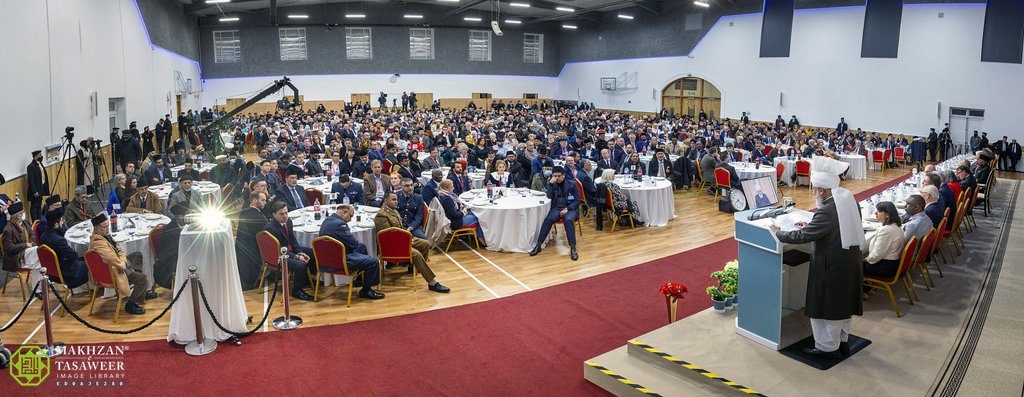
Islam’s Teachings Emphasise Superlative Justice
Contrary to these man-made laws, Islam’s teachings emphasise justice to such a degree that chapter 5, verse 9 of the Holy Qur’an states that the enmity of any nation or people must never incite one to deviate from the path of justice and fairness. Manifesting such integrity is nearer to righteousness. Even non-religious people will surely recognise the wisdom and benefit of adopting this preeminent standard of justice.
At the same time, you may wonder why, if Islam’s teachings are as I am describing, it is often alleged that Islam is an extremist religion. Indeed, this debate has come to the surface again in recent days due to inflammatory and misguided comments by certain politicians. In this regard, it should be categorically clear that the wars and battles fought by the Holy Prophet Muhammad (sa) and his Rightly Guided Successors were entirely defensive. The Holy Qur’an permitted the Muslims to fight back only as a last resort after they had been mercilessly attacked by the opponents of Islam and been the victims of years of sustained persecution. This permission is enshrined in chapter 22, verse 40 of the Holy Qur’an, which states that those upon whom war is forced unjustly have a right to defend themselves because they have been wronged and are the victims of oppression and persecution.
Moreover, the Holy Qur’an clarifies that permission to fight back was granted not just to defend Islam, but to defend all religions and to enshrine the principles of freedom of conscience and freedom of belief. Thus, in the subsequent verse, Allah the Almighty states that if He did not stop those who transgressed by means of others, then churches, synagogues, temples, mosques, and all other places of worship where the name of God is oft-recited would be destroyed. Hence, Muslims are commanded to defend and protect all religions and places of worship rather than cause them any harm.
Islam’s Rules of Warfare Are a Lesson for the Modern World
Furthermore, wherever the conditions for defensive wars were met, the Muslim armies were governed by stringent rules of engagement given by the Holy Prophet of Islam (sa). Firstly, he stated that wars must never be fought to fulfil personal or vested interests, to conquer lands, or to establish supremacy over others. Rather, Muslims are only permitted to fight if war is waged upon them. In the event of war, other nations should unite to stop the aggressor. Once the aggressor ceases to use force, the other nations should immediately end the war and seek to establish lasting peace. In addition, the Holy Prophet Muhammad (sa) strictly forbade targeting civilians, something all too common in the wars being fought in the modern world. Further, he instructed Muslims to ensure the scope of the war remained as limited as possible. All forms of escalation or expansion of the war, both in terms of territory and means, were to be avoided.
Islam also teaches that unless one’s opponent uses a place of worship as a military base, it is not permissible to violate the sanctity of a place of worship by fighting within it or even near it. It is strictly forbidden to knock down or desecrate the places of worship of your opponents. Further, the Holy Prophet Muhammad (sa) forbade the previously common practice of mutilating the bodies of enemy soldiers and instructed that their bodies were to be treated with care and respect. He also taught that no form of deception was permitted in warfare. As already outlined, women, children, the elderly, and other innocent civilians were never to be targeted. Similarly, priests, rabbis, or other religious leaders were not to be harmed or prevented from carrying out their religious duties.
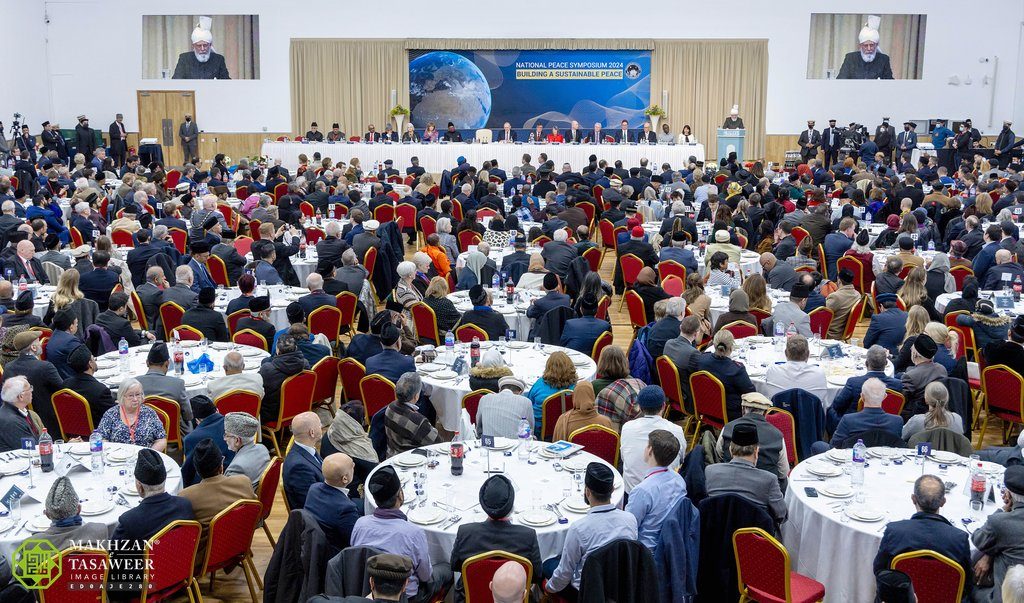
The Holy Prophet of Islam (sa) also prohibited Muslim soldiers from inflicting any form of terror or fear amongst the general public during wars. Indeed, all non-combatants and civilians were to be treated kindly, and no injustice was to be perpetrated against them. Furthermore, he instructed that Muslim armies should not make bases or camps in towns or areas where they would cause anxiety or discomfort to ordinary civilians. He stated that during battle, soldiers should not strike their opponents in the face and should cause them the least possible harm and distress. If prisoners of war were caught, they were not to be separated from their relatives if they, too, were imprisoned. Additionally, every effort was to be made to make prisoners of war comfortable, to the extent that their comfort and needs were to be prioritised over those of the captor. If a Muslim was guilty of any form of cruelty or harshness towards a prisoner of war, they were to release him immediately to make amends.
Another instruction of the Holy Prophet Muhammad (sa) was that the representatives or emissaries of other nations should be held in high esteem, and any mistakes or discourtesies on their part ought to be ignored in the interest of peace and harmony.
And so these are the basic Islamic rules of war, and the Holy Prophet (sa) said that if a Muslim violated these principles, it demonstrated that they were not fighting for justice; instead, they were fighting to inflict cruelty and out of self-interest. Without a doubt, every Muslim nation and government must abide by these Islamic teachings. Setting aside religion, I also believe if non-Muslim nations adopted these principles, then even if wars occurred, they would not lead to such deep-rooted enmities forming that remain embedded generation after generation. So, all nations involved in warfare, be they Western nations, those who harbour enmity for the Islamic world, or Muslim countries, should recognise that peace can only be established if they act upon these principles of warfare and conflict resolution. Otherwise, we lie at the precipice of a catastrophic global world war that will undoubtedly lead to such immense levels of destruction and carnage that lie far beyond our imagination.
Realisations of Western Academics
As I said earlier, many people are now reaching the same conclusion. For example, Professor Jeffrey Sachs, a highly respected economist from Columbia University, writes, “The world is on the edge of nuclear catastrophe, in no small part because of the failure of Western political leaders to be forthright about the causes of the escalating global conflicts.” He continues, “The relentless Western narrative that the West is noble, while Russia and China are evil is simple-minded and extraordinarily dangerous. It is an attempt to manipulate public opinion not to deal with very real and pressing diplomacy.” Professor Sachs continues, “Above all, at this time of extreme danger, European leaders should pursue the true source of European security: not US hegemony, but European security arrangements that respect the legitimate security interests of all European nations, certainly, including Ukraine, but also including Russia, which continues to resist NATO enlargements into the Black Sea. At this stage, diplomacy, not military escalation, is the true path to European and global security.” [1]
Furthermore, much has been written or spoken about the ongoing war between Israel and Hamas and the grave humanitarian situation in Gaza that worsens by the day. For example, during a recent interview, US Senator Bernie Sanders, who himself is Jewish, strongly condemned the actions of the Israeli government. He said, “What Netanyahu and his right-wing government are doing right now to the people of Palestine, of Gaza, is indescribable and unspeakable. I mean, we are looking at 25-26 thousand people who have been killed already (this was the figure when he [was] interviewed, now this figure has gone beyond this number), two-thirds of whom are women and children. 65,000 people have been wounded. We are looking at 70% of the housing units in Gaza have been damaged or destroyed. You are looking at 1.8 million people pushed out of their homes, God knows where they are going.” Senator Sanders continued by saying, “Right now, and I hope everybody hears this, you are looking at the possibility of hundreds of thousands of children starving to death, and we in the United States, through our financial support of Israel, are complicit in what is happening and I will be damned if I am going to give another nickel to the Netanyahu government in order to continue this war against the Palestinian people.” [2]
Asked if and how a settlement could be reached in the Middle East, Senator Sanders said, “The history of the region is terrible. It deals with the Holocaust, 6 million Jews, it deals with the displacement of hundreds of thousands of Palestinians from their homes, but at the end of the day, the Palestinian people are entitled to a homeland of their own. So, we are talking about a two-state solution.”
In addition to the two people I have quoted, many other commentators are now reaching the same conclusion about the critical state of the world I have long warned of. I take no satisfaction in this; rather, with all my heart I hope and pray that before it is too late, the world comes to its senses and brings an end to the brutalities and wars taking place in the world. Certainly, it is my opinion that there should be a full ceasefire between Israel and Hamas or Palestine, and also in the war between Russia and Ukraine. Thereafter, instead of inciting their respective allies towards further warfare, all members of the international community should prioritise ensuring relief efforts are stepped up to help those in desperate need and focus on bringing about a lasting and peaceful settlement. If, instead, we stand by and let these wars escalate further, countless more innocent lives will be lost, and surely, history will judge us with contempt as the author of our own destruction and misery.
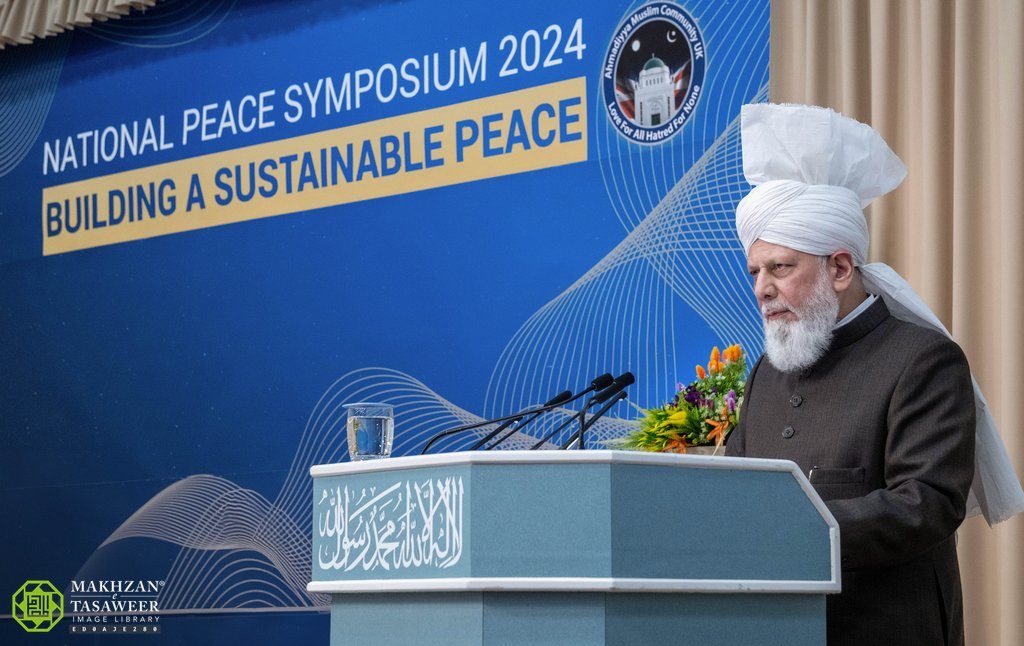
Saving Our Future Generations
And so, in conclusion, if we wish to save our future generations from being born with the ill effects of radiation caused by nuclear warfare, and desire to save them from deprivation and desperation and if we wish to save ourselves from their curses and laments, we must act with urgency and wisdom. Political leaders and those who have access to policymakers must take a long-term view of what is in the best interest of mankind rather than being blinded by a selfish desire to assert their superiority over others. We must all come together, setting aside national, political, and other vested interests for the greater good of humanity and to ensure that we leave behind a prosperous world for our future generations. It is the need of the time that we must focus all our energies and efforts on establishing true peace so that we may live in a world of hope and prosperity rather than a world defined by inequality, hatred, and bloodshed.
With these words, I sincerely thank all of our guests for joining us this evening and listening to what I had to say. I apologise for speaking at length, but I felt it necessary to do so, given the precarious state of the world. Thank you, and once again, I express my sincere appreciation to you all. Thank you very much.’
ENDNOTES
- https://www.jeffsachs.org/newspaper-articles/h29g9k7l7fymxp39yhzwxc5f72ancr
- https://twitter.com/BernieSanders/status/1754921738880593967?lang=en

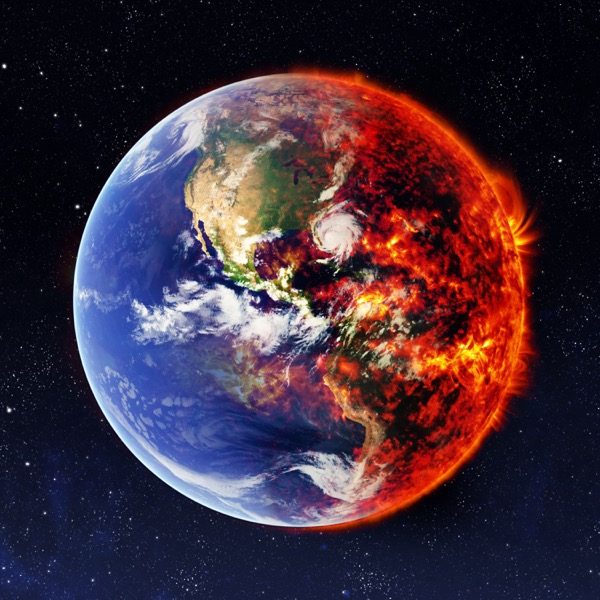


Add Comment